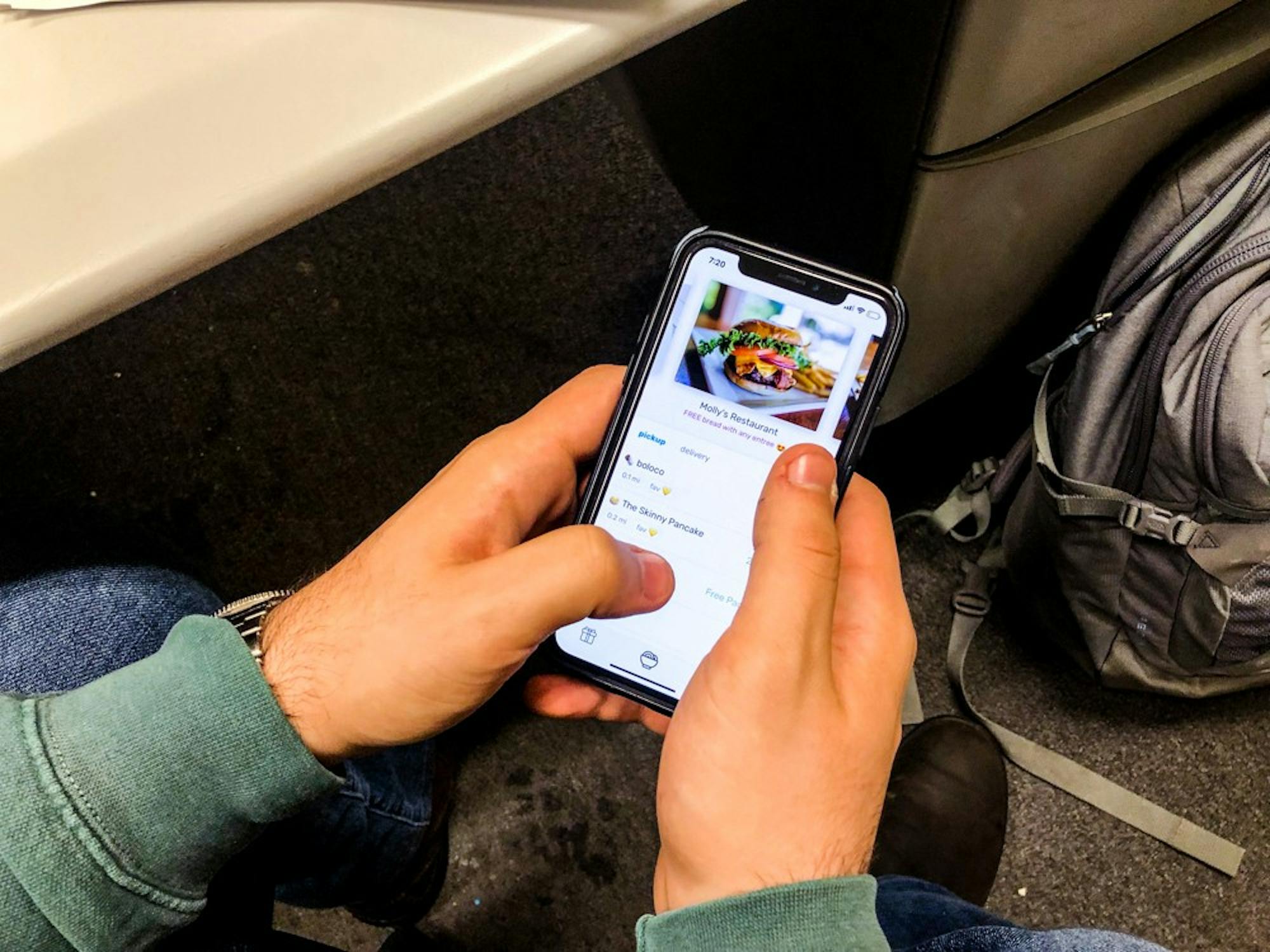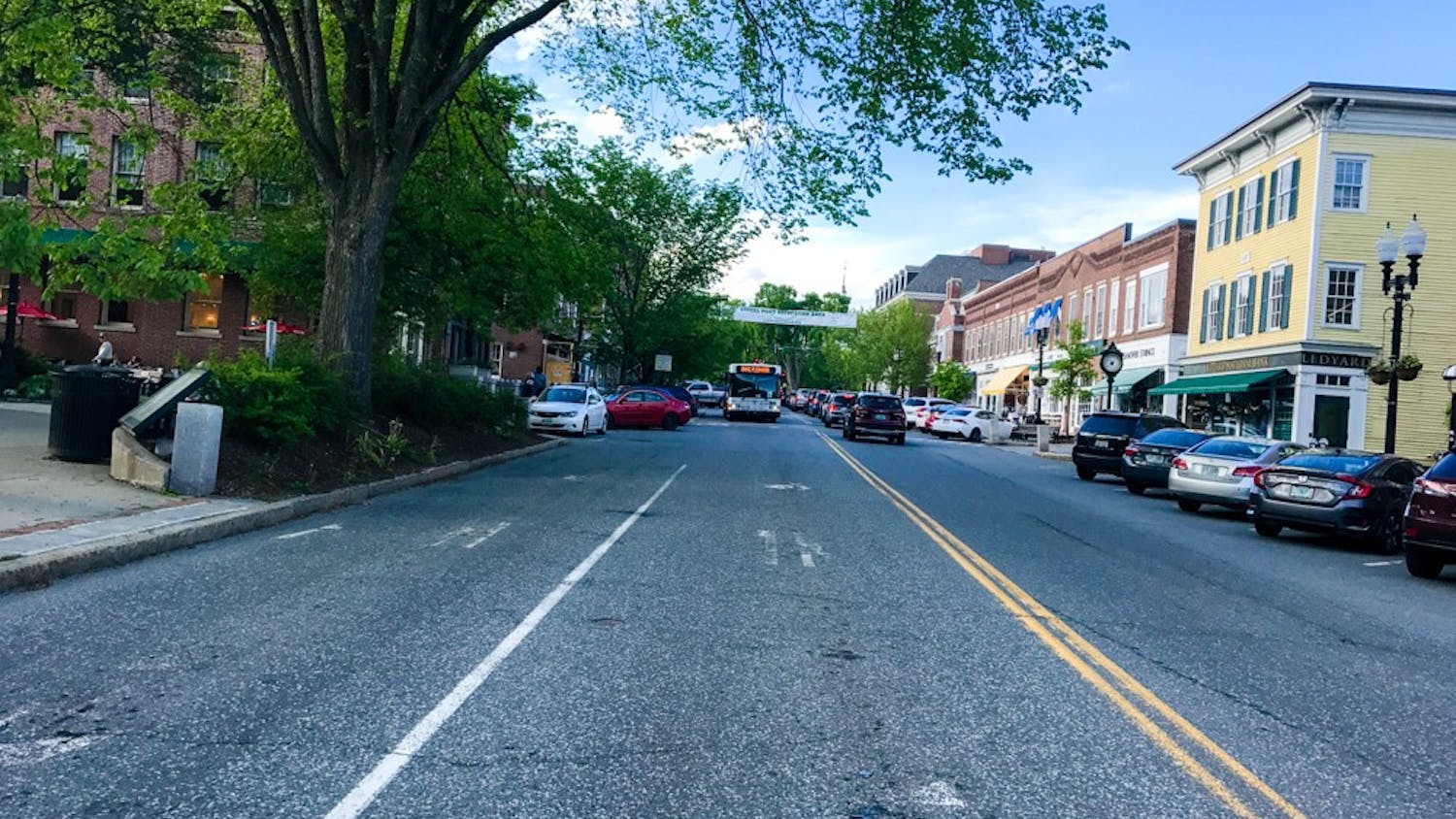Since its introduction on campus in April, the food-ordering application Snackpass has continued to gain popularity in Hanover through its promotions as well as unorthodox advertising tactics that have included offering free gear, sponsoring student ambassadors, and throwing events such as a rave and “darty.”
The company secured $21 million in Series A funding to grow the organization to over 100 college campuses in the next two years, though the company currently only has a presence on 11 campuses. Integral to this growth is the app’s food promotions. For example, today the app is offering 750 pad thai entrees — roughly valued at $9,400 — for free. Snackpass’ advertising strategy also plays a major role in their on-campus presence.
The company recruits student ambassadors involved in sports teams, Greek houses and other organizations to spread awareness about the app through their clubs and classes, according to Snackpass growth marketing manager Claudia Haimovici.
Campus ambassadors promote the app by making announcements at meetings, posting on social media and by helping coordinate Snackpass-sponsored events, Haimovici said. These events, at which Snackpass often provides free food and merchandise, have thus far included philanthropy events — as well as parties — at Greek organizations. Snackpass has also visited Dartmouth Hillel meetings, and the company is also looking to sponsor a cappella concerts in the future, according to Haimovici.
The campus director of Snackpass student ambassadors could not be reached for comment, and a student ambassador declined to comment for this story.
In downtown Hanover, Snackpass has expanded its presence, having partnered with many Hanover staples. These include Boloco, Lou’s Restaurant and Bakery, Molly’s, Sushiya and Tuk Tuk Thai Cuisine, among others. According to co-founder Jonathan Cameron, Snackpass works closely with these businesses — negotiating compensation for promotional deals in some cases — and helping with the implementation and maintenance of the technology. Snackpass also helps these businesses collect and analyze data on customers and customer interactions.
According to Snackpass’s online privacy policy, the data that the company may collect include “the websites you visit before or after our Websites and whether you have opened or forwarded our e-mails.” Additionally, the policy specifies that the company “may get [user] consent to share personal information about you with additional third parties,” and that the company may also share aggregated data with third parties “in a manner that does not identify particular individuals.”
Co-founder Jamie Marshall, however, stated otherwise.
“Just to be clear, we’re not sharing any customer data with anyone,” Marshall said. “We take customer data very seriously and are not sharing that with anyone.”
Cameron echoed this statement, noting that the company does not share user data with anyone other than the restaurant.
Cameron, who is the son of a restaurateur and grew up working in the restaurant business, emphasized his commitment to helping these locales continue to grow and succeed in their business through Snackpass’ technology. Important to that mission, Cameron said, is an on-the-ground presence and building a relationship with restaurant owners.
“For us, we really find that it’s important to not only have great relationships, but to understand their restaurant, and so we keep in touch with them on a daily basis,” Cameron said.
Cameron also said that he thinks Snackpass allows restaurants to bridge the gap in terms of their ability to advertise and offer promotions to consumers when compared to national chains like McDonald’s and Taco Bell.
According to Marshall, these promotions — which include the offer of free food for referring the app to friends and one “point” toward a free meal on every purchase — not only give students significant discounts, but they help restaurants bring in more business during slow hours. Marshall foresees these promotions continuing.
“At our other campuses where we’ve been around a lot longer, we pretty much have some deals going on every week ... and we’ve been there for two years or so,” Marshall said.
Tuk Tuk Thai owner Pannipa Pace said that while these promotions can at times overwhelm the kitchen and staff, the restaurant’s partnership with Snackpass has brought in new customers and increased the number of sales, particularly between 1 and 5 p.m., which Pace called the restaurant’s “slow hours.” There have been some technological hiccups, Pace said, but she was complimentary of the company’s client service.
Jarett Berke Tu’17, owner of Lou’s Restaurant and Bakery — an early adopter of Snackpass — was also complimentary of the company’s “accessible” client service, and added that Snackpass does a “good job” of building and maintaining their pickup menu. Berke also agreed, however, that Snackpass orders have overwhelmed the kitchen and staff on occasion.
Restaurants do have the ability to pause Snackpass during peak hours, and Berke said that after having a couple rough weekends, the business has “learned what the limits are.”
“We learned where we need to step in and shut it off, and we haven’t had too many issues since,” Berke said.
Regarding Snackpass’s effect on business, Berke said Lou’s averages 50 Snackpass orders on weekdays, and approximately 100 on weekend days.
“Even though we’re doing more orders than we were a year ago or two years ago, the amount of revenue hasn’t really changed that much — mainly because those additional orders that we’re fulfilling are lower value,” Berke said. “So we kind of have mixed feelings on the whole thing — obviously it’s good to have the business and there are some creative ways that we can try and increase average order value and not work harder for less money — but it’s kind of a wash, I guess.”
Students interviewed expressed mixed feelings about Snackpass’ prominence on campus and about Snackpass in general.
Zeke Baker ’20 described feeling ambivalent toward Snackpass. He said that he doesn’t use the app because he’d prefer to use the meal plan he has spent money on.
“It’s like everyone’s talking about it and it just kind of gets annoying to me, partially because I know I’m not really going to participate in that because that’s spending way more money off campus than I really want to,” Baker said.
Rachel Ackerman ’22 holds a positive view of the app.
“I’ve only used it three or four times, but I like it because it seems to be faster than any other way of getting pickup food,” Ackerman said. “I haven’t used it for delivery yet, but I think for picking up it just make things so much easier and think it’s very streamlined.”
Zach LaPorte ’22, a Snackpass user, has also had a positive experience.
“It’s easy to build up points and get meals that I want anyways,” LaPorte said. “Once a week, I’ll go into town and get something, so I’ll just use Snackpass because I’ll eventually get more rewards from it. So I think it’s pretty useful.”





